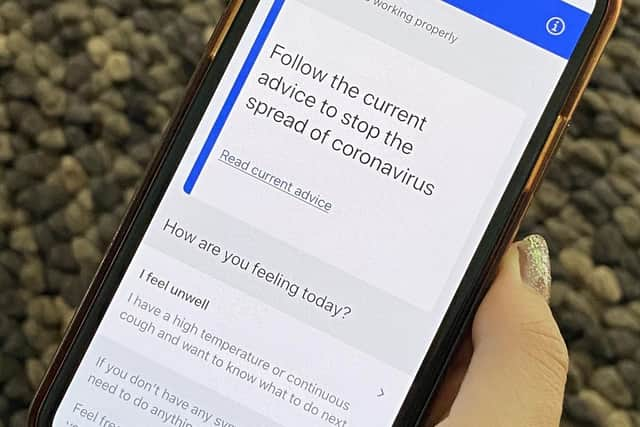Success of NHS track and trace app depends on members of the public using it properly, Yorkshire researchers have said
The UK government’s testing and contact-tracing system is currently being tested on the Isle of Wight after the app went live on the island on May 5, and is expected to be launched to the rest of the UK in June, if it proves successful.
The British Psychological Society (BPS) has published a briefing, informed by leading behavioural psychologists, which highlights the importance of behavioural science in the success of the government’s new digital contact tracing app.
Advertisement
Hide AdAdvertisement
Hide AdProfessor Madelynne Arden, from Sheffield Hallam University, the lead author of the briefing, said the research identified at least four things people would need to do to ensure the app is a success.


The public need to: download the app, carry a functional phone at all times, identify they have Covid-19 symptoms and report them on the app, and act on messages from app to self-isolate.
Professor Arden, who is the director for the Centre of Behavioural Science and Applied Psychology at the university, said to do this, people must have the "capability, opportunity and motivation to do so, each of which is dependent upon a range of factors."
She added: "Reducing the spread of Covid-19 is paramount and the government’s track and trace app is a key tool in its strategy. However, it is peoples' behaviour that will determine if it is a success."
Advertisement
Hide AdAdvertisement
Hide AdOutlining the likely barriers to people using the app, the research highlighted the importance of understanding these within the context of people’s lives.


This includes understanding people’s occupation, role and employment status, gender, socio-economic group, ethnic group, experience of physical and/or learning disabilities, age group and the different levels of risk from severe Covid-19.
Dr Angel Chater, chair of the BPS Behavioural Science and Disease Prevention Taskforce, said: "Understanding the drivers and barriers behind the behaviours for different groups is essential to both the uptake and engagement of the app."
The research has recommended that behavioural science is integrated within the app.
Advertisement
Hide AdAdvertisement
Hide AdDr Chater said: "Messaging that encourages people to use it should draw from behavioural science; highlighting clear and achievable behavioural strategies and outcomes.
"We’ve drawn from behavioural science, a rapid review of research in the area and our wider guidance launched earlier in the pandemic, to highlight the likely challenges that the team behind the app and related communications should consider.
"We strongly advise that further research be undertaken to better understand the potential barriers to the apps usage, to enable us to recommend appropriate solutions."
_______________________________
Editor’s note: first and foremost - and rarely have I written down these words with more sincerity - I hope this finds you well.
Advertisement
Hide AdAdvertisement
Hide AdAlmost certainly you are here because you value the quality and the integrity of the journalism produced by The Yorkshire Post’s journalists - almost all of which live alongside you in Yorkshire, spending the wages they earn with Yorkshire businesses - who last year took this title to the industry watchdog’s Most Trusted Newspaper in Britain accolade.
And that is why I must make an urgent request of you: as advertising revenue declines, your support becomes evermore crucial to the maintenance of the journalistic standards expected of The Yorkshire Post. If you can, safely, please buy a paper or take up a subscription. We want to continue to make you proud of Yorkshire’s National Newspaper but we are going to need your help.
Postal subscription copies can be ordered by calling 0330 4030066 or by emailing [email protected]. Vouchers, to be exchanged at retail sales outlets - our newsagents need you, too - can be subscribed to by contacting subscriptions on 0330 1235950 or by visiting www.localsubsplus.co.uk where you should select The Yorkshire Post from the list of titles available.
If you want to help right now, download our tablet app from the App / Play Stores. Every contribution you make helps to provide this county with the best regional journalism in the country.
Sincerely. Thank you.
James Mitchinson
Comment Guidelines
National World encourages reader discussion on our stories. User feedback, insights and back-and-forth exchanges add a rich layer of context to reporting. Please review our Community Guidelines before commenting.